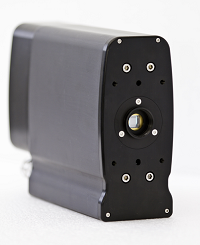|
||||||||||||||||||||||||||||||||||||||||||
|
||||||||||||||||||||||||||||||||||||||||||
World-class imaging technology in high-performance OCAM²k EMCCD camera
Go to
OCAM²k
Go to Standard resolution monochrome
cameras
Go to High-sensitivity cameras
Go to First Light Imagery
New, low-light, camera with very impressive speeds from First Light
|
|
The very
best in wave front-sensing technology |
| A unique attribute of the OCAM²k is the inclusion of Deep Depletion Silicon feature for enhanced red sensitivity - the only EMCCD camera to offer this distinctive feature. | |
| Key features |
||
| • 240 x 240 24µm pixels - state of the art EMCCD sensor | • 14 bits precision A/D converter | • Ultra-low latency cameralink full interface |
| • Factory-calibrated gain adjustable from 1 to 1000 | • Cooled operation for low dark current | • Optional fibre interface |
| •2000 FPS (up to 3700 with optional binning mode) | • Integrated temperature controller | • Clock & trigger input / output for synchronous operation |
| • Deep depletion silicon option | • Fully sealed resistant aluminum body | • Extremely robust and compact, hand-assembled body |
| • Liquid cooled for silent, non-turbulent operation that does not require chilled water | • Synchronization option at nanoseconds level for complex multi-sensor arrays. | |
| Typical performance specs |
OCAM²k |
| Mean readout noise at 2000 fps and multiplication gain ~500 | 0.3 e- |
| Quantization | 14 bits |
| Dark signal at 2000 fps at -45°C | <0.01 e- pixel-1 frame -1 |
| Operating temperature | -45°C |
| Peak Quantum Efficiency at 650nm, STD Silic | 92% |
| Peak Quantum Efficiency at 650/750nm, Deep Depletion Silic | 95% |
| Supply voltage/current | 24 to 25V / 6 amp |
| Supply cooling water temperature | 5 to 35°C |
What is EMCCD?
EMCCD sensors were designed to respond to a growing need for significantly
higher levels of sensitivity. An Electron Multiplying Charged Coupled
Device (EMCCD) is a relatively new technology platform that is capable
of detecting single photon events, without an image intensifier, whilst
maintaining high Quantum Efficiency. It is achieved with the unique electron-multiplying
structure built into the sensor. It is the combination of minimal noise
floor and high Quantum Efficiency that makes an EMCCD sensor the most
sensitive detector technology currently available.
Adept Turnkey Pty Ltd are "The Machine Vision and Imaging Specialists" and distributor of First Light products in Australia and New Zealand. To find out more about any First Light Imagery or any other machine vision products, please call us at Perth (08) 9242 5411 / Sydney (02) 9905 5551 / Melbourne (03) 9384 1775 or contact us online.
|
If you like this page, please recommend and share it. |
|||
| More | |||




